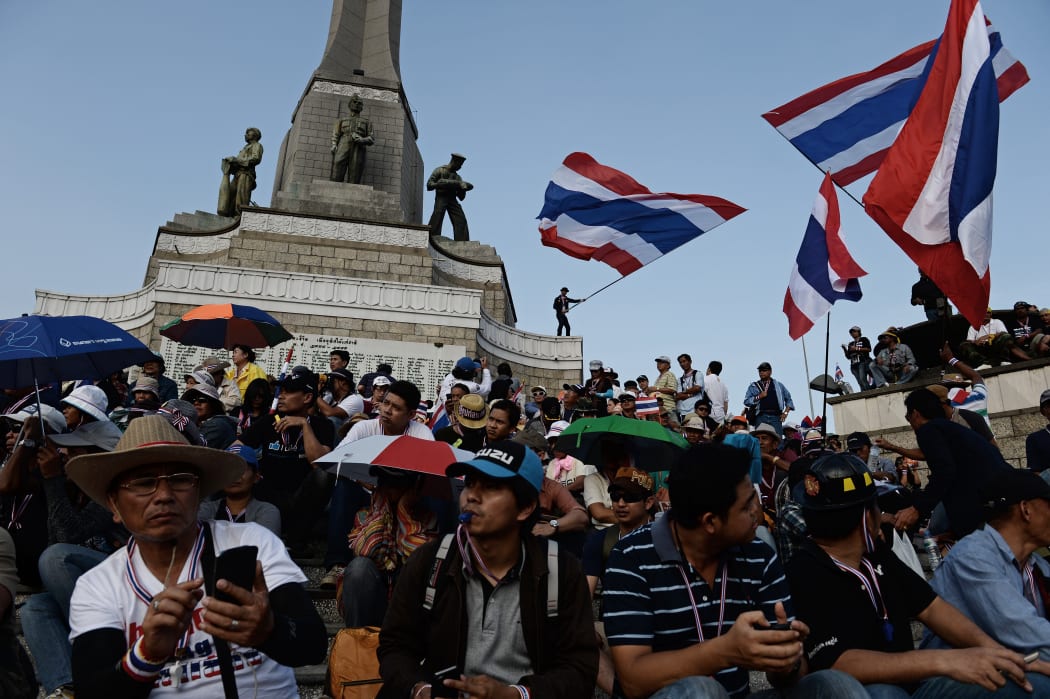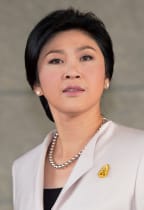Protesters trying to topple Thailand's government moved to tighten the blockade around ministries and police headquarters on Tuesday, while major intersections in the capital Bangkok remained blocked.
The turmoil is the latest chapter in an eight-year conflict pitting the Bangkok-based middle class and royalist establishment against the mostly poorer, rural supporters of Prime Minister Yingluck Shinawatra and her brother, Thaksin Shinawatra, a former premier ousted by the military in 2006.

Anti-government protesters at the Victory Monument in downtown Bangkok. Photo: AFP
Many ministries and the central bank were forced to work from back-up offices on Monday after protesters led by Suthep Thaugsuban stopped civil servants getting to work and urged them to keep doing this until Ms Yingluck steps down, Reuters reports.
Groups of demonstrators marched peacefully from their seven big protest camps to ministries, the customs office, the planning agency and other state bodies on Tuesday, aiming to paralyse the workings of government.
A student group allied to Suthep's People's Democratic Reform Committee (PDRC) threatened to attack the stock exchange, with faction leader Nitithorn Lamlua telling supporters on Monday it represented "a wicked capitalist system that provided the path for Thaksin to become a billionaire". A spokesperson for the committee said the bourse was not one its targets.
Jarumporn Chotikasathien, president of the Stock Exchange of Thailand, said emergency measures had been prepared to secure the premises and trading systems.
Many schools have been closed from Monday to Wednesday as a precaution in case of trouble, but shops and most private offices were open, even if many shoppers and commuters appeared to be avoiding the city centre.
The government has deployed 10,000 police to maintain law and order, along with 8000 soldiers at government offices, but they are keeping out of sight.
The unrest is the worst since 2010, which were against a government led by the current opposition party. More than 90 people, mostly civilians, died.
Cabinet meeting cancelled

Yingluck Shinawatra. Photo: AFP
Any disruption to government services would compound the problems faced by Prime Minister Yingluck Shinawatra, who dissolved parliament in December and called a snap election for 2 February.
She now heads a caretaker administration that has a limited remit and cannot initiate policies that commit the next government, Reuters reports.
Ms Yingluck has worked since Monday from Defence Ministry facilities on the outskirts of Bangkok. Officials said that Tuesday's regular cabinet meeting had been cancelled.
The Prime Minister has invited protest leaders and political parties to a meeting on Wednesday to discuss an Election Commission proposal to postpone the election until May.
However, protest leader Suthep Thaugsuban has repeatedly said he is not interested in any election. He wants the government to be replaced by an unelected "people's council" that will change the electoral system as part of reforms that will weaken Mr Thaksin's sway.
The opposition Democrat Party is boycotting February's election.
Thaksin in exile
Thaksin Shinawatra turned to politics after making a fortune in telecommunications. He redrew Thailand's political map by courting rural voters and won back-to-back elections in 2001 and 2005.
He now lives in exile to avoid a jail sentence handed down in 2008 for abuse of power, but he is seen as the power behind Ms Yingluck's government. Their Puea Thai Party seems likely to win any election held under present arrangements.
Ministers have said they want to avoid confrontation, hoping the protest movement will eventually run out of steam. It flared up at the start of November last year when the government tried to force through a political amnesty that would have allowed Ms Thaksin to return home a free man.

